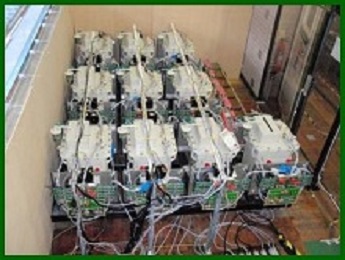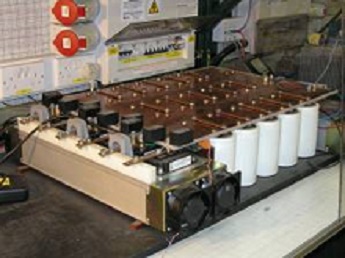Power Electronic Systems

Multi-level multi-cell 500kw prototype
The incorporation of power electronics in systems makes them more versatile, achieve superior functionality, and attain higher efficiency. They are key to achieving a low carbon future and smart living.
We interact with such power electronic systems in our everyday life, e.g. when using smart and ultra-efficient household appliances, consumer electronics, chargers, efficient power supplies and more. We also get to interact with such systems with an increased frequency in transport where power electronic systems are enabling the electrification of the carbon intensive sectors of automotive, rail, aerospace and marine.
Power electronics is used in a wide range of applications to convert electrical power from one voltage and current to another. For example, in an electric vehicle power electronics is needed to interface the battery to the traction drive, typically converting the power from a low to a high DC voltage and then to an AC voltage. In a smart grid system power electronics is needed to interface various hybrid energy storage systems such as the battery, supercapacitor and / or fuel cell, solar PV, wind energy system etc. to the electrical loads or power grid. The size, efficiency and cost of the power electronic system is currently one of the factors limiting the widespread up-take of low-carbon energy systems, and a similar situation is found in many other areas such as more-electric aircraft, electric vehicle and ship.

Multi-phase resonant converter (puse)
It is anticipated that the next big significant contribution and utilisation of power electronic systems will be in the sector of electrical energy supply: generation, transmission, and distribution. As we strive to reduce our carbon footprint and to make our cities smarter, power electronic systems will be used extensively to improve the stability, efficiency, and intelligence of the grid, to achieve deeper penetration of renewable energy in the electricity mix and to enable the uncompromised widespread use of electric vehicles.
PEMC Academics researching Power Electronic Systems
Specialises in:
- Power Electronics
- Aerospace and Automotive
- Microgrids
- Renewable Energy systems
Specialises in:
- High Power Converters
- Variable Speed Drive Systems and Electromagnetic Compatibility
Specialises in:
- Control of Power Electronics and Systems
Specialises in:
- Power Electronics for High Voltage Applications
Specialises in:
- Automotive Power Electronics
- High Bandwith
- Silicon Carbide
Specialises in :
- Design and Power Converters
- Renewable Energy Storage
- Aviation